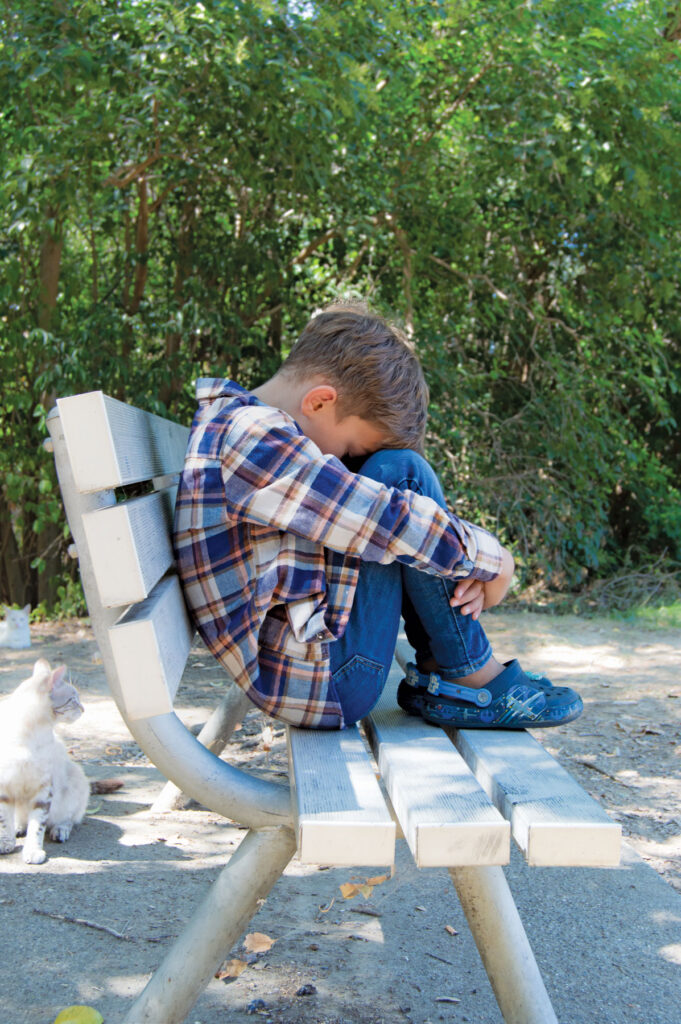Kids with poor mental health struggle more than other kids with many life skills. They worry more, find it hard to make decisions, display problem behaviors, have more frequent and longer tantrums, have fewer friends and they are easily overwhelmed. Worse, mental health issues tend to have a great ripple effect. For instance, a child struggling with stress and anxiety may find it harder to make friends and will therefore struggle socially.
We now know that many things affect children’s psychological wellbeing. The good news is that there are simple things that you can do at home to improve your child’s mental health. Here are four easy ways to get started.

Children struggling with stress and anxiety find it hard to make friends. Photo by Kimberly Parodi
Ensure that your child is getting enough sleep
A recent study by the University of Maryland School of Medicine found that sleep deprivation has an impact not only on children’s cognitive capabilities but on their mental health as well. The researchers found that children who did not receive sufficient sleep were more likely to experience depression and anxiety and to display impulsive behavior. Sleep deprivation is also associated with problem behavior, stress and anxiety, distraction, memory problems, poor problem solving, irrational decision-making, obesity and poor mental health – yet kids are getting less sleep today than ever before.
The University of Maryland study researchers found that improving sleep habits and ensuring that kids received the recommended hours of sleep could help reverse some of the negative mental health effects. The current sleep recommendations are:
- Toddlers (1–2 years): 11–14 hours per 24 hours. (including naps)
- Preschoolers (3–5 years): 10–13 hours per 24 hours. (including naps)
- School aged children (6–12 years): 9–12 hours per 24 hours.
- Teens (13–18 years): 8–10 hours per 24 hours.
Here are two simple things that you can do to ensure that your child is getting enough sleep:
Adopt a bedtime routine. Bedtime routines reduce sleep-related conflicts. They also mentally prepare kids for bed by helping them to start winding down. Most kids need about 30 minutes to wind down, so it is important to factor that in when deciding when the bedtime routine should begin. It is also important to stick as much as possible to a non-negotiable bedtime.
No screen time before bedtime. Several studies have found that using screens right before bedtime can affect children’s quantity and quality of sleep. Banishing screens from their bedrooms roughly an hour before their bedtime is an easy way to ensure that screens do not affect their sleep.
It is important to remember that children imitate their parents. Children whose parents are always on their screens are more likely to have a harder time disconnecting. Adopting a “no-screen rule” for all an hour before bedtime can be beneficial for your entire family.
Adopt a meditation or mindfulness routine
The available studies on mindfulness and meditation activities for children suggest that these practices improve kids’ mental health, boost children’s ability to deal with difficult emotions and reduce their stress and anxiety. Several studies have found that children who are given opportunities to practice mindfulness have lower stress levels and greater focus and concentration.
The good news is that there are easy ways to help your child to practice mindfulness. For example, taking them on nature walks and encouraging them to observe their environment, teaching them breathing exercises or asking them to count their breath, encouraging them to do age-appropriate yoga poses, encouraging journaling, or even starting a “stretches” routine before their bedtime are all easy ways to promote mindfulness. Mindfulness apps specially designed for kids can help them to adopt a mindful disposition.
Allow your child to do less
Experts advise that kids today are under so much pressure it is affecting their mental health. They warn that the crazy homework loads, the unending extracurricular activities and the excessive screen times all mean that children are constantly overstimulated, mentally or otherwise, and they therefore have fewer opportunities to just be and to rest. There is no “one-size-fits-all” response when determining how many activities are good for your child, but being attentive to their behavior and to their sleep patterns can help you determine whether they are doing too much and need a break to preserve their mental health.
Make a conscious decision to be more present
Numerous benefits are associated with spending time as a family; a stronger sense of identity, fewer behavioral issues, better sibling relationships and stronger parent-child bonds, just to name a few. That said, spending time as a family isn’t as much about quantity than it is about quality. In other words, if you’re in the same room with your kids but everyone is fixated on their phones, it doesn’t really count as quality time.
Being 100% present, even for just 20 minutes every day, can do your children a world of good. One easy way to get started is to adopt a 20-minute daily family routine during which you can do something as simple as reading together, playing a board game, going for a walk, meditating or listening to music. Ask your family for suggestions of activities they would like to do. Remember to keep the activities sufficiently simple to avoid getting overwhelmed and giving up.
Reduce uncertainty
Uncertainty is one of the key factors that influences children’s mental health, irrespective of whether that uncertainty is associated with an inconsistent parenting style or with an absence of routines. Children thrive on regular routines. Knowing exactly what to do and what to expect gives children some form of security and helps to reduce stress and anxiety.
Let your child know what is expected of them in the morning, what they are expected to do once they get home from school, and what they are required to do before they sleep. Having clear parenting rules and expectations and consistently praising good behavior and applying consequences for unwanted behavior will also help them understand exactly what is expected of them.
As with all things, improving your child’s mental health must begin by improving your own mental health. We are all the worst versions of ourselves when we are tired, anxious, stressed and constantly angry. Take care of yourself first. Get sufficient sleep. Ask for help if you are feeling overwhelmed. Talk to a professional if you’re struggling with mental health issues. See the North State Parent Family Resource Guide Mental and Emotional Health section for listing of some mental health resources by county in the North State.
Posted in: Health & Nutrition
Comment Policy: All viewpoints are welcome, but comments should remain relevant. Personal attacks, profanity, and aggressive behavior are not allowed. No spam, advertising, or promoting of products/services. Please, only use your real name and limit the amount of links submitted in your comment.
You Might Also Like...

Healthy Teeth, Bright Smiles – Local Dentists Share Bite-Sized Tips
Smile! February is National Children’s Dental Health Month, and we’ve checked with local dentists for tips on helping children go the distance with this year’s “gold medal smile” theme. Get […]

Newborn Care: What You Need To Know Before The Baby Comes
Healthcare professionals don’t want to interrupt the euphoria of a beautiful birth by giving you too much information immediately, but once you are on your own with your baby you […]

The Subtlety of Heart Disease in Women
Heart Disease is Often Subtle in Women Know the Signs, What to Do, and How to Prevent It The leading cause of death among women in the United States is […]

Your Kids’ Cereal – Part of a Nutritious Breakfast? Nah.
I am old enough to remember when Honey Smacks cereal was called Sugar Smacks. So it’s no surprise to me that a serving of the cereal has more sugar than a […]



